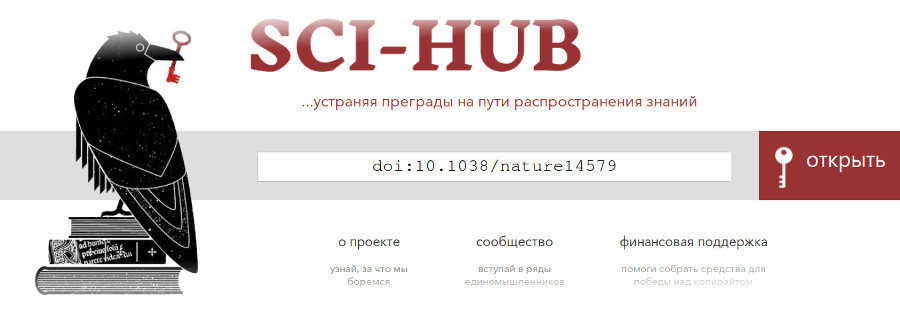
The world's largest academic publishing house Elsevier has long struggled with the resources that are hosted for free of those scientific works for which access this organization requires a lot of money. A few days ago, the publishing house obtained from the US District Court for the Eastern Judicial District of the State of New York a positive decision on
its lawsuit against Sci-Hub and LibGen. Alexandra Elbakyan, the founder of Sci-Hub, says she will not be able to pay the required amount even if she really wanted to do it. Now, as she claims, “Pirate Bay for Science” will continue to work.
The court proceedings on the suit filed by Elsevier lasted two years. The main complaint of the publisher is that the "scientific pirated sites" laid out in the public domain the materials of scientists, without any right to do so. In spite of the fact that the same Sci-Hub is a little similar to the usual pirate resource with warez, according to the lawyers of Elsevier, this site is still pirated.
By the way, the publishing team has already received a preliminary decision of the court, which stated that Alexandra Elbakyan (an interview with her can be viewed
here ) is forbidden to provide third-party access to Elsevier content. But instead of closing the resource, she and her team continued to develop it, downloading hundreds of thousands of documents per day.
Elbakyan contacted the court before, but then she chose not to have anything to do with him. The same decision was made by the team of another resource, against whom the lawsuit was filed by Elsevier, LibGen. As a result, the court decided to recover from the defendants $ 15 million in compensation for damages. The decision also states that it is necessary to delimit the domain names of both resources.

As mentioned above, Elbakyan stated that she does not have that kind of money. “The financial resources of the project for all 6 years of its operation have not reached the volume of $ 15 million,” said Elbakyan.
She also questioned the court’s decision that money is being levied to compensate for the “irreparable damage” of the publisher. According to Elbakyan, this is nonsense. In addition, she stated that the site will continue to work: “Sci-Hub will continue to work as usual. If you have problems with domain names, you can use TOR, the address is scihub22266oqcxt.onion. ”
With regard to the trial, the final decision was supported by many publishers and copyright holders. Such an organization as the Association of American Publishers (AAP) declared its full satisfaction with the decision of the court. “As the decision shows, the court was not deceived by saying that illegal activity is a benefit to society,” said the president of this organization.
He was echoed by a representative of the international organization STM (International Association of Scientific, Technical and Medical Publishers), saying that Sci-Hub does not bring any benefit. He says that instead, the site offers unlicensed content that anyone can "steal". But this opinion does not agree hundreds of thousands of scientists who regularly visit the site to download documents that may
be important in their work.
Scientists of all calibers and specialties support the resource, both with the help of online articles and financially. The site is fully funded by voluntary donations. The administration does not limit access to information. Elbakyan
believes that scientific articles are public knowledge: “In general, I understand the publication of any information as a thought that a person wants to convey to the world. In this case, the value for the author is not in the money earned, but in the fact that his idea has been recognized. Therefore, for example, at the beginning of our era, it was a common practice to indicate the author of his work not himself, but some celebrity or God in general. So it was more likely that they would take seriously the published ideas. ”
Interestingly, before the Elsevier suit, the Sci-Hub site was not very well known to the general public. But after the proceedings began, much more users learned about it. This is the "Streisand effect" in its purest form.
“In any case, there should be no restrictions on access to scientific works. There should not be such that a person could not get acquainted with the text of scientific work just because there is not enough money. And there should be no obstacles if someone wants to distribute scientific work, for example, on his website or in social. network, only due to the fact that it is prohibited by copyright. It’s immoral to prevent the spread of knowledge, ”says Elbakyan.
It is not yet clear how the funds referred to in the court order will be levied.